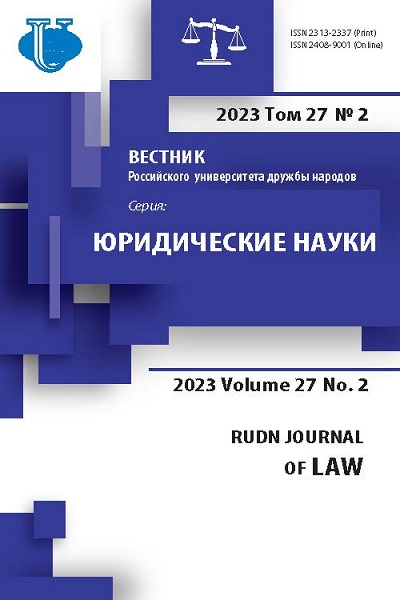Legal support for the development of sustainable and secure information and telecommunications infrastructure
- Authors: Belousov A.L.1
-
Affiliations:
- Financial University under the Government of the Russian Federation
- Issue: Vol 27, No 2 (2023)
- Pages: 500-521
- Section: LAW AND DIGITAL TECHNOLOGIES
- URL: https://journals.rudn.ru/law/article/view/35038
- DOI: https://doi.org/10.22363/2313-2337-2023-27-2-500-521
- EDN: https://elibrary.ru/GPPYPM
- ID: 35038
Cite item
Full Text
Abstract
The relevance of the work is due to the need to adapt regulatory mechanisms to the actively developing digitalization processes. On the other hand, in the context of growing cyber threats and increasing dependence of public relations on information and telecommunications technologies, the directions for the development of legislation that ensure stability and security of the relevant infrastructure are subject to a certain rethinking in the legal aspect. The subject of the study is the legal support for the development of a sustainable and secure information and telecommunications infrastructure. The purpose of the work is to identify key areas for improving legal regulation in the field of functioning and development of sustainable and secure information and telecommunications infrastructure. The study applies methods of analysis, synthesis and comparison, as well as literal and systematic interpretation of the norms of the current legislation in the field of functioning and developing sustainable and secure information and telecommunications infrastructure. Finally, conclusions are formulated regarding the need for the development of legal regulation in this area. The research outlines the specific directions for changing the legal field, which ensure the sustainable development of information and telecommunications infrastructure in the Russian Federation.
About the authors
Andrey L. Belousov
Financial University under the Government of the Russian Federation
Author for correspondence.
Email: andreybelousov@mail.ru
ORCID iD: 0000-0002-9069-8830
SPIN-code: 3633-3515
ResearcherId: L-2766-2018
Candidate of Economic Sciences, Associate Professor of the Department of Legal Regulation of Economic Activities
49 Leningradsky prospect, Moscow, 125167, Russia FederationReferences
- Adelmeyer, M., & Teuteberg, F. (2018) Cloud computing adoption in critical infrastructures -status quo and elements of a research agenda. In: MKWI 2018 Proceedings. Germany, Lüneburg. pp. 1345-1356.
- Belousov, A.L. & Levchuk, E.Yu. (2018) Digitalization of the banking sector. Finance and credit. 24(2), 455-464. https://doi.org/10.24891/fc.24.2.455 (in Russian).
- Belousov, A.L. & Shustrov, A.A. (2022) Opportunities of using the blockchain technology in the insurance industry. Digest Finance. 27(1), 89-107. https://doi.org/10.24891/fc.25.1.196 (in Russian).
- Buzdugan, A. & Capatana, G. (2022) Cyber security maturity model for critical infrastructures. In: Ciurea, C., Boja, C., Pocatilu, P. & Doinea, M. (eds.) Education, Research and Business Technologies. Smart Innovation, Systems and Technologies. Vol. 276. Springer, Singapore. pp. 225-236. https://doi.org/10.1007/978-981-16-8866-9_19.
- Ciaian, P., Rajcaniova, M. & d’Artis, K. (2018) Virtual relationships: Short- and long-run evidence from BitCoin and altcoin markets. Journal of International Finansicial Markets, Institutions & Money. (52), 173-195.
- Dehling, T., Lins, S. & Sunyaev, A. (2019) Security of critical information infrastructures. In: Reuter, C. (ed.) Information Technology for Peace and Security. Springer Vieweg, Wiesbaden. pp. 319-339. https://doi.org/10.1007/978-3-658-25652-4_15
- Goryan, E.V. (2018) Institutional mechanisms for ensuring the security of the critical information infrastructure of the Russian Federation and Singapore: a comparative legal aspect. Administrative and municipal law. (9), 49-60. https://doi.org/10.7256/2454-0595.2018.9.27762 (in Russian).
- Ghafir, I., & Saleem, J. et al. (2018) Security threats to critical infrastructure: the human factor. The Journal of Supercomputing. (74), 4986-5002. https://doi.org/10.1007/s11227-018-2337-2
- Leszczyna, R (2019) Cybersecurity controls. In: Cybersecurity in the electricity sector. Springer, Cham. pp. 181-209. https://doi.org/10.1007/978-3-030-19538-0_7
- Linkov, I. & Kott, A. (eds.). (2019) Fundamental concepts of cyber resilience: introduction and overview. In: Cyber resilience of systems and networks. Risk, systems and decisions. Springer, Cham. pp. 1-25.https://doi.org/10.1007/978-3-319-77492-3_1.
- Polyakova, T.A. & Shinkaretskaya, G.G. (2020) Issues of formation of the international information security system in the context of transformation of law and new challenges and threats. Law and State: Theory and Practice. 10(190), 138-142. https://doi.org/10.47643/1815-1337_2020_10_138 (in Russian).
- Polyakova, T.A. & Troyan, N.A. (2022) Formation of scientific and legal approaches to the development of a system for the use of digital technologies in rule-making. Legal policy and legal life. (1), 43-58. https://doi.org/10.24412/1608-8794-2022-1-43-58 (in Russian).
- Savenkov, A.N. (2017) Counteracting cybercrime in the financial and credit sphere as a vector for ensuring global security. State and Law. (10), 5-8. (in Russian).
- Shinkaretskaya, G.G. & Berman, A.M. (2020) Digitalization and the problem of ensuring national security. Education and Law. (5), 254-260. https://doi.org/10.24411/2076-1503-2020-10544 (in Russian).
- Shinkaretskaya, G.G. & Berman, A.M. (2022) Cyberattacks - the illegal use of digital technologies. International Law. (1), 40-50. https://doi.org/10.25136/2644-5514.2022.1.37271 (in Russian).
- Sicari, S., Rizzardi, A. & Grieco, L.A. (2015) Coen - Porisini A. Security, privacy and trust in Internet of things: the road ahead. Computer Networks. (76), 146-164.
- Tvaronavičienė, M., Plėta, T., Casa, S.D. & Latvys, J. (2020) Cyber security management of critical energy infrastructure in national cybersecurity strategies: cases of USA, UK, France, Estonia and Lithuania. Insights into Regional Development. 2(4), 802-813. https://doi.org/10.9770/IRD.2020.2.4(6)
- Vandezande, N. (2017) Virtual currencies under EU anti - money laundering law. Computer law & Security review. (33), 341-353.
- Zharova, A.K. (2019) Legal support of information security in “smart cities”. Lawyer. (12), 69-76. https://doi.org/10.18572/1812-3929-2019-12-69-76 (in Russian).
- Zharova, A.K. (2020) Issues of ensuring the security of a person's digital profile. Lawyer. (3), 55-61. https://doi.org/10.18572/1812-3929-2020-3-55-61 (in Russian).
Supplementary files















